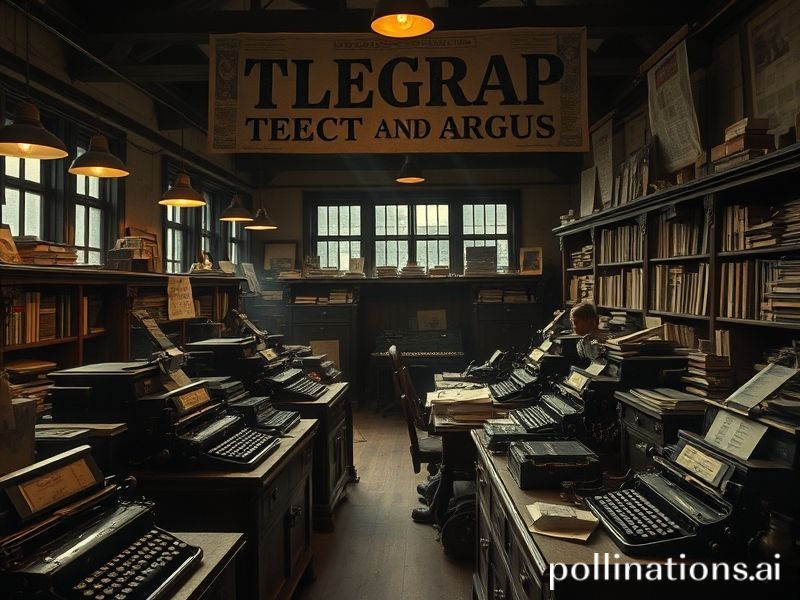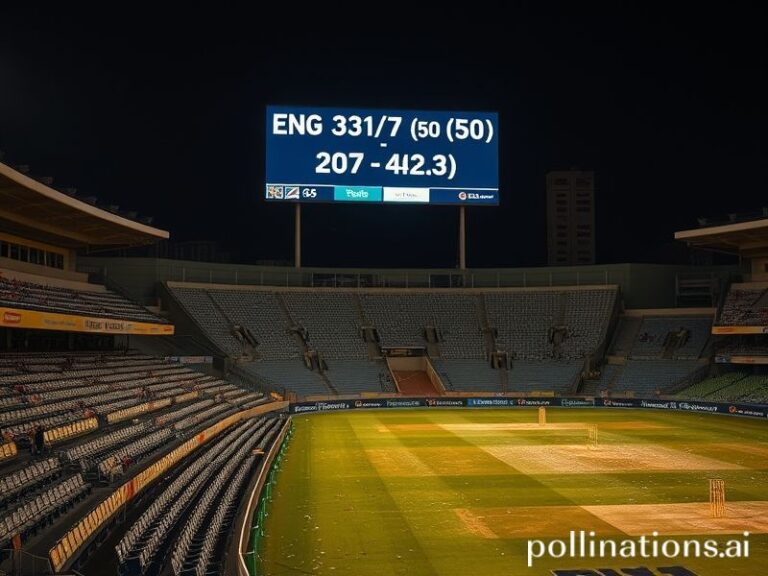Bradford’s Telegraph & Argus: The Provincial Paper Quietly Running the World by Ignoring It
The Telegraph & Argus: Yorkshire’s Last Provincial Punch Line in a World That Forgot to Laugh
By Our Man in the Global Waiting Room, Still Holding Yesterday’s Paper
Bradford, West Yorkshire – If you mention the Telegraph & Argus at Davos, the average delegate will assume you’ve mispronounced “cryptographic argot” and invite you to pitch a blockchain startup. Yet this 157-year-old daily—known locally as the T&A, a double entendre the staff stopped giggling at sometime after Suez—is arguably the most honest piece of media still breathing in the Anglosphere. While the rest of us doom-scroll through algorithmic outrage, the T&A continues to report which kebab shop was fined for mouse droppings and whose cat got stuck on a mosque roof. In other words: civilization’s last unfiltered feed.
Globally, this matters. When every masthead from Jakarta to Johannesburg chases the same viral spillover from Washington’s latest constitutional burlesque, a paper that still obsesses over the precise decibel level of a Bradford City football chant is performing an act of radical geopolitical dissent. Call it micro-solidarity: the insistence that somewhere on Earth the agenda remains stubbornly municipal, even as the ice caps file for divorce. The T&A’s online readership now eclipses the population of Bradford itself—Pakistani diaspora in Toronto, Mirpuri cabbies in Oslo, and a surprisingly robust fan club of Japanese urban-planning nerds who fetishize Victorian wool mills. They don’t log on for breaking news; they come for the anesthetic of provincial minutiae, a reminder that not every crisis needs a blue check-mark and a UN resolution.
Of course, the paper isn’t above modern pieties. Last year it launched a paywall so polite it apologizes twice before declining your credit card. Circulation is holding at 14,000 print copies—roughly the daily output of Helsinki’s saunas—but the website clocks 1.2 million unique browsers a month. That’s more eyeballs than the combined population of Estonia and Latvia, nations that have collectively decided the T&A’s coverage of “Man Fined for Feeding Seagulls Chips” is more uplifting than any Eurovision entry.
Irony arrives gift-wrapped: the T&A was founded to amplify the voice of Bradford’s textile barons, cheerleaders for the same British Empire that later outsourced their jobs to the very countries whose emigrants now read the paper online, homesick for chip-shop gossip. The descendants of those mill lords now run artisanal sourdough pop-ups in Saltaire, pricing out the descendants of the weavers. Nothing says progress like an £8 loaf commemorating the labor that originally earned 8p an hour.
Internationally, the T&A functions as a low-fi counter-espionage tool. Intelligence analysts, burned out on SIGINT intercepts, reportedly mine the police blotter for patterns in human behavior untainted by geopolitical theater. If the price of stolen bicycles in Bradford suddenly spikes, perhaps the global black market is pivoting to two-wheeled crypto-currency. Meanwhile, Chinese state media has started translating the T&A’s “Send Us Your Snow Photos” features as evidence of Western decline: “Look, they’re reduced to celebrating frozen water.” Fair point, though Beijing hasn’t seen the invoices for gritting.
What the paper lacks in foreign bureaus it compensates for in accidental prophecy. A 1993 headline—“Local Man Says Internet Won’t Catch On”—now circulates Reddit as meme scripture. The reporter, long retired, still gets interview requests from German podcasters eager to understand Brexit-level self-delusion. He tells them the same thing: “We were only half wrong. The internet did catch on; nuance didn’t.”
So here we are, orbiting a planet where billionaires race to Mars because Earth got too interesting, yet a scrappy Yorkshire daily keeps filing copy on pigeon-racing disputes as if the sun still never set on worsted wool. The Telegraph & Argus may not save humanity, but it offers something rarer: a control group. While the rest of us binge on apocalypse, Bradford quietly insists tomorrow will contain both traffic cones and cricket scores. If that isn’t hope, it’s at least a plausible alibi.







